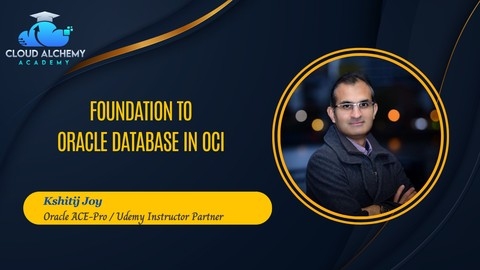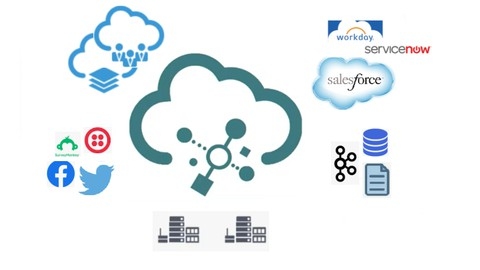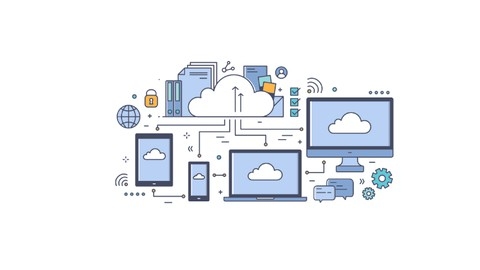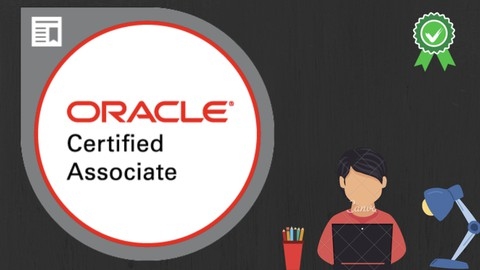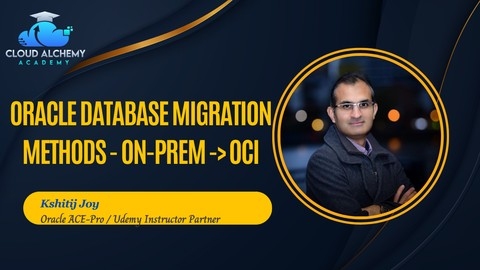Oracle Cloud is a powerful and versatile platform that offers a wide range of services, from compute and storage to databases and analytics.
Learning Oracle Cloud can open doors to exciting career opportunities in cloud computing, allowing you to manage and deploy applications and services on a global scale.
Mastering Oracle Cloud can help you build and manage secure and reliable cloud infrastructure, optimize your organization’s cloud operations, and stay ahead of the curve in a rapidly evolving technological landscape.
Finding a high-quality Oracle Cloud course on Udemy can be a daunting task.
With so many options available, it can be overwhelming to choose the right course that meets your learning style and career goals.
You’re looking for a course that provides a solid foundation in Oracle Cloud fundamentals, delivers hands-on experience, and is taught by experienced instructors who can guide you through the complexities of this platform.
We’ve carefully reviewed numerous Udemy courses and have identified Foundation to Oracle Database in Oracle Cloud Infrastructure as the best overall course.
This comprehensive program covers a wide range of topics, from cloud computing fundamentals to the intricacies of managing Oracle databases within the OCI environment.
You’ll gain valuable practical experience by creating and managing virtual machines, configuring networks, and implementing security measures, all while learning from industry experts who are passionate about sharing their knowledge.
While Foundation to Oracle Database in Oracle Cloud Infrastructure is our top pick, there are other great options available on Udemy that cater to different learning styles and career goals.
Keep reading to explore our recommendations for beginner-friendly introductions, advanced courses focused on specific Oracle Cloud services, and programs tailored to specific career paths.
Foundation to Oracle Database in Oracle Cloud Infrastructure
You’ll start by building a strong foundation in cloud computing, understanding different cloud service models like IaaS, PaaS, and SaaS, and exploring the benefits of embracing the cloud.
From there, you’ll dive into Oracle Cloud, delving into its subscription models and the robust Oracle Cloud Infrastructure (OCI).
The course doesn’t just lecture—it equips you with hands-on skills.
You’ll gain practical experience by creating compartments and Virtual Cloud Networks (VCNs) in OCI, showcasing how to manage and configure these essential elements.
You’ll also explore a wide range of Oracle Database Cloud services, including Oracle Database Cloud Service, Oracle Database Exadata Cloud Service, and Oracle Database Exadata Express Cloud Service-Managed.
Security is a cornerstone of working with cloud databases.
You’ll learn to establish secure SSH connections using public and private keys, ensuring you can access your databases with confidence.
You’ll even get comfortable connecting to your databases using SQL Developer, a powerful tool for database administration.
The course goes beyond traditional database management, introducing you to the cutting-edge world of autonomous databases.
You’ll learn about the different types of autonomous databases, such as ATP and ADW, and discover how to provision and configure them.
You’ll also gain valuable knowledge on how to secure these databases by configuring Database Vault.
The course is packed with practical demos and interactive exercises, turning theory into tangible skills.
You’ll leave this course with the ability to provision, manage, and securely connect to Oracle databases in Oracle Cloud.
You’ll also develop expertise in essential topics like database patching and security, preparing you for a wide range of cloud-based database administration tasks.
Oracle Fusion Cloud HCM R13 Global HR Implementation
This course dives deep into the world of Oracle Fusion Cloud HCM R13, equipping you with the knowledge and skills to confidently implement it in a global setting.
It’s not just about theory – you’ll get your hands dirty with practical exercises.
You’ll start by building a solid foundation in cloud applications and understanding Oracle’s unique cloud offerings.
Then, you’ll delve into the crucial aspect of Enterprise Setup, where you’ll learn to configure your company’s structure, including Locations, Departments, and Legal Entities.
Key entities like Jobs, Positions, and Approval Groups are explored in detail, ensuring you can manage employee relationships and workflows effectively.
The course then takes you on a journey through the intricacies of global HR implementation.
You’ll master the art of managing employee hires, transfers, and terminations across diverse locations and time zones.
You’ll also become proficient in using the Document of Record (DOR) system, streamlining document management within the system.
Configuration of approval workflows is covered in depth, allowing you to ensure smooth and compliant processes.
Beyond the core functional aspects, the course also delves into technical areas.
You’ll learn how to develop and deploy BI Reports, harness the power of the HCM Data Loader for data uploads, and configure HCM Extracts for efficient analysis.
Understanding the Oracle Fusion Employment Model, including Person Numbers and Worker Numbers, is thoroughly covered, along with troubleshooting common real-time issues that might arise.
This course is a comprehensive resource, designed to equip you with the skills necessary for successful Oracle Fusion Cloud HCM R13 implementation.
Learn Oracle Cloud Infrastructure Fundamentals
This course is your comprehensive guide to navigating the world of Oracle Cloud Infrastructure (OCI).
It’s not just about theory; you’ll gain practical skills through hands-on labs, empowering you to confidently build and manage secure and reliable cloud resources.
Imagine starting with the fundamentals: Understanding what OCI is, its key components, and how to set up your account.
From there, you’ll dive into managing compute instances (virtual machines), building secure networks (VCNs), and mastering storage options like block and object storage.
You’ll learn how to secure your environment with OCI’s robust Identity and Access Management (IAM) system, making sure your data is safe.
The course goes beyond the basics, taking you into the world of load balancing, a vital tool for ensuring your applications are fast and reliable.
You’ll gain experience with different tools, like the OCI command-line interface (CLI) and cURL, giving you flexibility in how you manage your cloud environment.
Oracle Fusion Technical - Oracle Integration Cloud OIC Gen2
Starting with the fundamentals of cloud computing, you’ll gain a solid understanding of the different cloud offerings like SaaS, PaaS, and IaaS.
Then, you’ll dive headfirst into the OIC platform itself, getting hands-on experience with powerful tools like SOAP UI, FTP, and Postman, which you’ll use to build and test integrations.
The course covers a wide range of integration styles and patterns, including SOAP and REST APIs.
You’ll learn how to integrate with Fusion SaaS using both SOAP and REST adapters, tackling complex scenarios like importing data into Fusion ERP Cloud using the File Based Data Import Automation (FBDI) process.
You’ll also learn to connect OIC with on-premise systems using the Connectivity Agent, a crucial component for integrating with your existing infrastructure.
This course doesn’t stop at the basics.
You’ll delve into advanced concepts such as lookups, publish-subscribe mechanisms, and exception handling.
You’ll even explore how to leverage OIC to interact with Fusion BI reports, allowing you to extract data from these reports and write it to various destinations like databases or FTP servers.
The course covers everything you need, from the core principles of cloud integration to the practical skills required to design, build, deploy, and manage integrations in a real-world setting.
It guides you through version control, packaging, monitoring, and troubleshooting, ensuring you’re equipped to handle any challenge.
This course is your launchpad for mastering OIC Gen2.
Whether you’re a developer, administrator, or business user, you’ll find the knowledge and practical skills you need to excel in the world of cloud integration.
Oracle Fusion Technical - A Complete Technical Guide
This course offers a comprehensive dive into Oracle Fusion Cloud, equipping you with the skills to effectively navigate its architecture, leverage its product families, and master key tools for reporting and automation.
You’ll start with a solid foundation in cloud services and Oracle Fusion Cloud, then move on to practical skills like file-based data import using FBDI.
This is where things get interesting - you’ll learn to automate this process using Oracle SOA Suite and Java, significantly boosting your efficiency.
You’ll also explore SOAP web services and REST APIs, essential tools for seamlessly connecting Oracle Fusion Cloud with other applications.
The course dives deep into crucial areas like Oracle Transactional Business Intelligence (OTBI) and BI Publisher.
You’ll learn to build reports, create engaging dashboards, and visually analyze data.
You’ll also explore Enterprise Scheduler Service (ESS) jobs for task automation and Fusion security best practices to ensure your data is safe.
Throughout the course, you’ll gain hands-on experience with powerful tools like ADFdi Spreadsheet Loader, UCM web services, and SOAP UI.
The syllabus even includes an introduction to Oracle Integration Cloud (OIC) and demonstrates how to build integrations with FBDI.
Oracle Cloud Infrastructure Foundations Practice Tests
This is a comprehensive collection of practice sets and tests designed to mirror the real exam format, giving you a realistic feel for what to expect.
You’ll find practice sets covering key areas like compute, networking, storage, and security.
These sets delve into the practical aspects of managing and operating these services within the Oracle Cloud environment.
You’ll get hands-on with creating and managing virtual machines, configuring networks, setting up storage, and implementing security measures.
While the course provides a valuable foundation, it’s important to note that it primarily focuses on practice and test preparation.
You’ll need to supplement this with a deeper understanding of the underlying concepts and technologies.
Additionally, the course offers access to a Discord server, providing a platform to connect with other learners.
This can be a valuable resource for clarifying doubts and sharing experiences.
However, the level of activity and engagement on the Discord server may vary.
Ultimately, the course offers a good starting point for your Oracle Cloud certification journey.
But to truly succeed, you’ll need to combine its practice materials with focused study and exploration of the wider Oracle Cloud ecosystem.
Oracle Database Migration Methods :On-Prem to OCI
This comprehensive course provides a thorough guide to successfully migrating your on-premises Oracle databases to Oracle Cloud Infrastructure (OCI).
You’ll begin by gaining a solid understanding of foundational concepts like endianness and database character sets, which are crucial for a smooth migration process.
Next, you’ll learn to set up your on-premises environment using tools like Vagrant and Oracle VirtualBox, ensuring a robust foundation for your transition.
The course delves into various migration methods, including Data Pump, RMAN, and even utilizing SQL Developer.
You’ll explore real-world use cases for each method, learning how to apply them effectively.
Hands-on demos help you grasp the practical aspects of each technique, from Data Pump conventional export/import to RMAN cross-platform transportable PDBs.
You’ll even discover how to manage inconsistent backups and leverage the Oracle Cloud Backup Module for seamless migration.
The course also covers migrating databases from AWS RDS to OCI, demonstrating how to provision an Oracle database within AWS RDS and utilize AWS Data Migration Service (AWS DMS) for efficient migration.
You’ll learn to create replication instances, source and target endpoints, and execute migration tasks, ultimately equipping you with the skills to transfer your databases between cloud environments.
Connecting and working with Oracle Cloud DBaaS
If you’re seeking a practical introduction to connecting and managing Oracle databases in the cloud, this course provides a solid foundation.
You’ll start by creating your own Oracle Cloud account and setting up an Oracle Database Cloud service.
The course then guides you through establishing an SSH connection, a vital tool for secure remote database management.
You’ll delve into the specifics of using popular tools like SQL Developer and Toad for Oracle, gaining hands-on experience with connecting to the database via various methods, including the command line and SQL Developer.
You’ll even explore how to access the database using a C program.
While the course focuses on foundational concepts, you’ll gain a valuable starting point for further exploration and development of your Oracle database skills within the cloud environment.
Oracle Cloud ERP(SaaS) Technical- ICS/VBCS, Dell Boomi Bonus
You’ll start with the basics, learning how to add users and roles, create and modify ESS Jobs, and navigate the core functionalities of Oracle Fusion ERP.
But the real strength of this course lies in its deep dive into integration and customization.
You’ll explore the power of SOAP and REST APIs, learning how to seamlessly integrate Oracle Cloud ERP with other systems.
The course will guide you through creating REST APIs for custom objects using Application Composer, giving you the power to extend the functionality of Oracle Cloud ERP to meet your specific business needs.
You’ll also learn about data import using FBDI and FBL, and discover how to upload custom messages and files using REST APIs.
This course goes beyond the basics, equipping you with the skills to automate data flow and streamline processes within your organization.
For those looking to further enhance their integration expertise, the course delves into advanced tools like Oracle ICS (Integration Cloud Service), PCS (Process Cloud Service), and Dell Boomi.
You’ll learn how to build complex integrations using FTP, SOAP, and REST, giving you the flexibility to connect Oracle Cloud ERP with a wide range of technologies.
Finally, the course concludes with a practical introduction to VBCS (Visual Builder Cloud Services), empowering you to build custom web applications.
You’ll gain hands-on experience creating user interfaces, customizing page composers, and developing techno-functional process flows.
This course provides a solid foundation for anyone seeking to become proficient in Oracle Cloud ERP.
The blend of theoretical knowledge and practical application will leave you well-prepared to tackle real-world integration challenges and build custom solutions that drive business value.
1Z0-931- Oracle Autonomous Database Cloud Specialist
This courses prepares you for the Oracle Autonomous Database Cloud Specialist certification exam (1Z0-931).
You’ll begin with a thorough understanding of OCI and its growing prominence in the market.
From there, you’ll delve into the architectural components of ADB, exploring how it integrates with the OCI platform and its robust security features.
The course doesn’t shy away from practical application.
You’ll gain hands-on experience with a range of powerful tools, including SQL Developer, Data Pump, Golden Gate, Data Sync, and DBMS_CLOUD, all while working directly with ADB.
You’ll master essential skills in monitoring, managing, and maintaining your Autonomous Database for optimal performance and security.
The curriculum concludes with a deep dive into advanced analytics and reporting using Autonomous Data Warehouse (ADB).
You’ll learn to connect, build analytical views, and even explore the exciting possibilities of machine learning within this platform.
This course is particularly valuable for IT professionals seeking a strong foundation in cloud technologies and looking to specialize in Oracle’s Autonomous Database solutions.
However, if you’re seeking advanced-level training for specific use cases or in-depth explorations of advanced database concepts, you may want to consider additional resources alongside this course.
